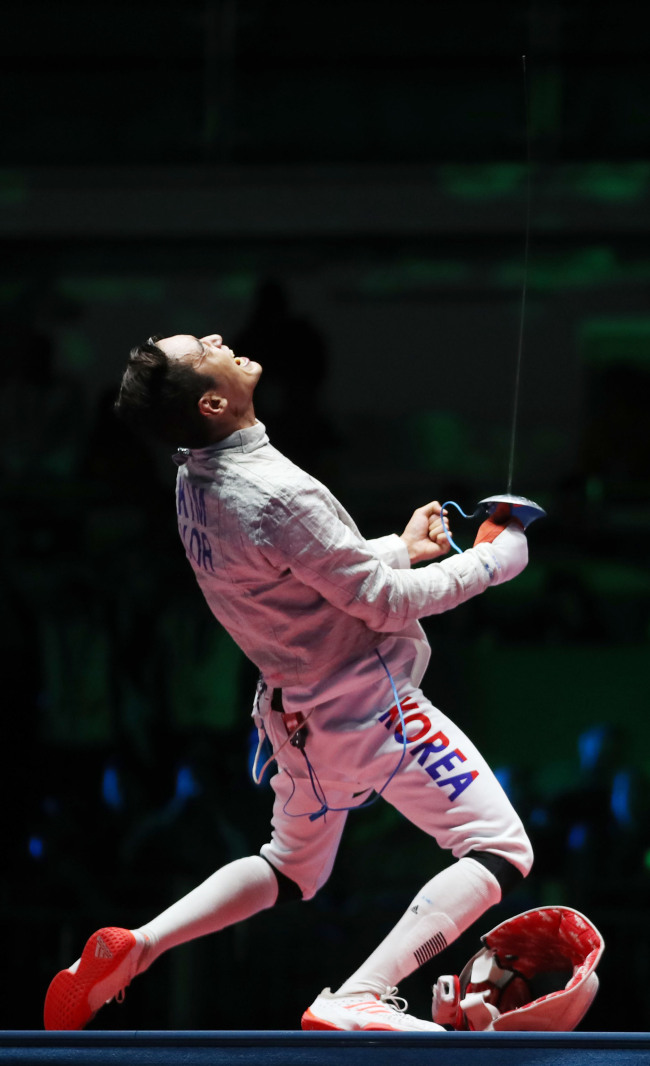South Korean fencer Kim Jung-hwan isn't necessarily a fan of football, but he admires Cristiano Ronaldo, the Portuguese superstar for Real Madrid.
It's how Ronaldo -- widely considered one of the world's very best -- has defied critics and worked his way to the top in his sport that has captivated Kim.
 |
Park Hae-mook/The Korea Herald |
While it's not clear how much of Ronaldo's influence helped Kim win the bronze medal in the men's individual sabre Wednesday at the Rio de Janeiro Olympics, Kim said he tried to take the same approach to fencing that Ronaldo has been doing in his sport.
"I consider myself a late bloomer," the 32-year-old said. "And Ronaldo wasn't maybe so well-respected early in his career, but he proved his worth with nothing but hard work. I admire his philosophy."
At the start of the competition, Kim said he wasn't thinking about winning a medal, but about doing his best in each and every match.
His mindset changed a bit once he got to the semifinals against the defending Olympic champion, Aron Szilagyi of Hungary, just one win away from securing at least a silver medal.
That's when Kim said he started losing his cool and started getting ahead of himself. And he lost the match 15-12.
"I would've performed better in the semifinals if I'd kept my emotions in check," Kim said. "After losing that one, I returned to the practice piste and I was a mess."
Kim was able to get better control of his emotions because he remembered an old lesson.
"I knew if you want to win too much, your body will tighten up and you can't really perform to your capabilities," he said. "Obviously, there is no athlete who doesn't want to win. But it's just a matter of controlling your excitement and staying within yourself."
On the surface, though, it was difficult to tell if Kim was ever in control of his emotions at any point Wednesday. He was consistently one of the most animated fencers in action, screaming and pumping his fist with almost every point as if he'd just won a gold medal.
For sabre fencers, such gestures are designed in part to sell their case to the referee, who has much discretion in awarding points on simultaneous hits. And for Kim, it's a calculated move that he hopes will get into his opponents' heads.
"If I yell and jump around with every point, then it's bound to intimidate the opponents and make them defensive," said Kim, who quipped that he sometimes gets dizzy from all the screaming. "The opponents may start thinking, 'That guy is coming right after me.' And I try to use that to my advantage."
South Korean fencing got off to a shaky start, getting shut out of medals in the first three days -- after winning six medals, with two gold, in London. Then Park Sang-young came out of nowhere to win the men's individual epee gold Tuesday, and Kim, who won the sabre team gold in 2012, followed suit with the bronze.
"I think our performance in London put a lot of pressure on the whole team," Kim said. "Sang-young's gold medal was our breakthrough, and I was determined to keep the momentum going for us. In London, we also had a slow start, and then medals came in bunches."
Kim dedicated his medal to his late father, who passed away from a heart attack in 2009. His old man had wanted to see Jung-hwan at an Olympics, but Kim couldn't qualify for the 2008 Beijing Games and his father was no longer with him when he won the 2012 gold.
"When I missed Beijing, he told me everything would be fine as long as I made the London team," Kim said, choking back on tears.
"After I won the bronze, I looked up to the sky and knew he was watching me from there." (Yonhap)








